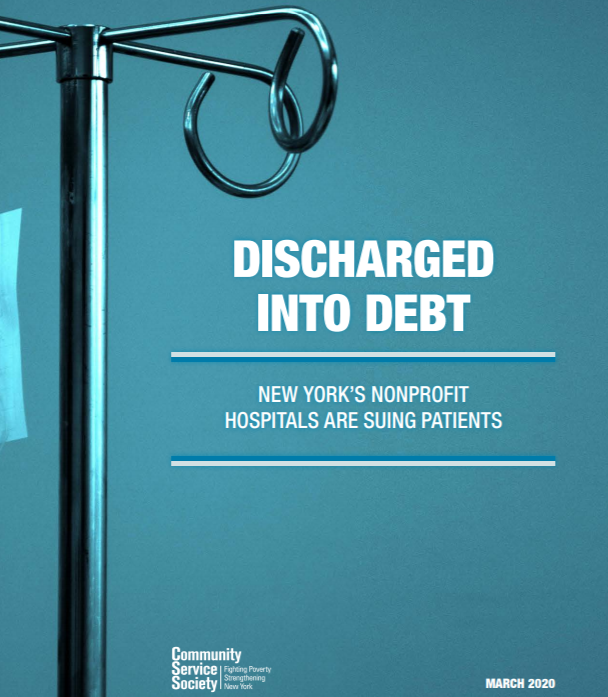By Bob Cohen, Policy Director, Citizen Action New York

The COVID-19 pandemic is exposing just how broken the US health care system is, including our inability to control disease outbreaks when many people simply cannot afford basic medical care. Patients should never fear seeking medical care because of cost, but for many New Yorkers that is the reality. And a new report by the Community Service Society highlights one of the worst outcomes for patients who cannot pay their medical bills – lawsuits filed against them by the hospitals they turned to for help. The report, “Discharged Into Debt,” finds that New York hospitals have filed over 30,000 debt collection lawsuits in the past five years. The study only looked at hospitals in 26 of New York’s 62 counties – which means the actual number of lawsuits is much higher.
New York State’s non-profit hospitals have a social mission. Legally, they are charities that pay no federal, state or local taxes and receive a total of $1.1 billion each year from the ICP. As a condition for receiving this funding, hospitals are required to offer financial assistance to patients without insurance.
The report, based on an examination of the New York State Ecourts public database and a sample of hundreds of individual case files, documented a number of abusive practices by New York hospitals. For example, hospitals claimed in legal papers that they were entitled to payment for unspecified items like “miscellaneous” and “ancillary procedures” charges. And, because New York allows hospitals to charge an outrageous 9% interest rate on outstanding bills and to tack on court fees on top of that, the median amount the hospital sued on was $1,900 but the median judgment amount was $2,300. In many cases, hospitals sued patients that were eligible for financial assistance without offering it, as required by law.
The report also found large racial disparities in the treatment of patients that owe medical debt, particularly upstate. In counties like Onondaga (Syracuse), Monroe (Rochester), Albany and Erie (Buffalo), a much higher proportion of people were referred to collections for medical debt in communities of color than white communities.
And, the study documents, patients were almost always totally outmatched by large collection law firms retained by the hospitals. Process servers often illegally serve relatives or co-tenants instead of patients, violating basic provisions of the U.S. constitution and in state laws designed to make sure people have reasonable notice of lawsuits so they can adequately defend themselves. And, 97% of the patients in the study were unrepresented and didn’t even attempt to respond to the lawsuit. The result is often wrecked credit, and unpaid judgments that threaten the financial futures of consumers and their families.
The CSS report adds to the case for passage of the Patient Medical Debt Protection Act (A.8639/S.6757), which addresses some of the most egregious medical billing practices. Fixing these practices, including lawsuit abuses, is a critical step in fixing our broken health care system and making health care affordable to low and moderate income New Yorkers.
